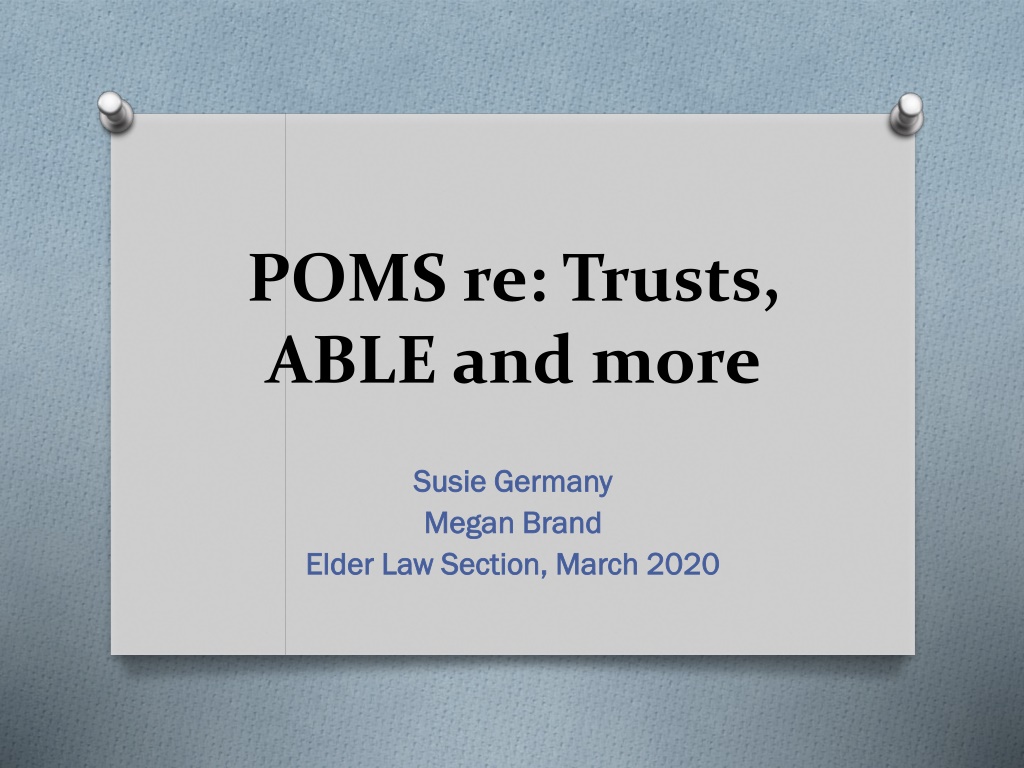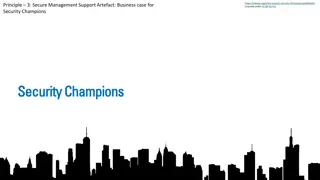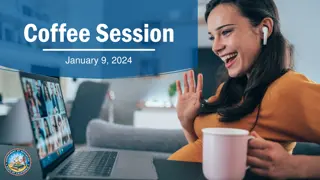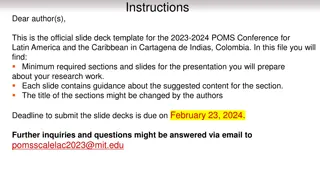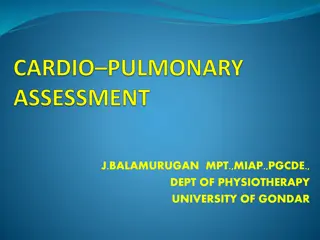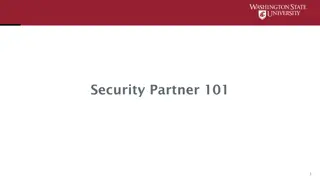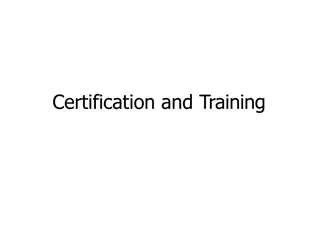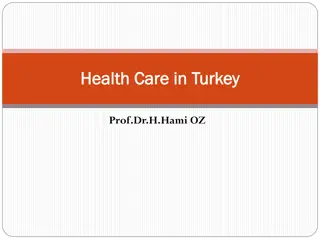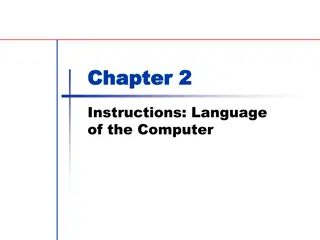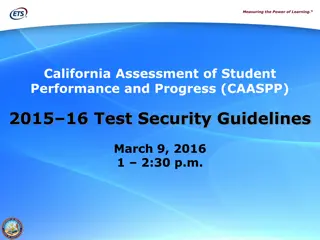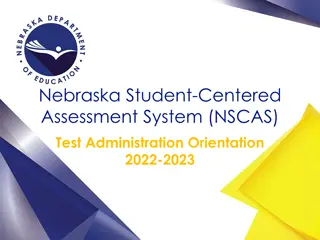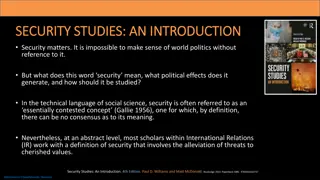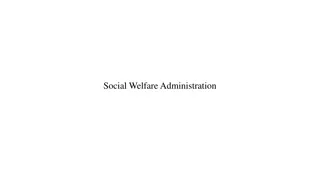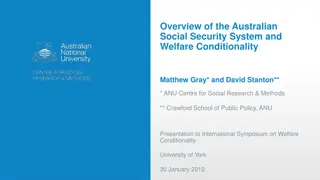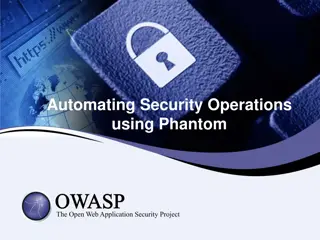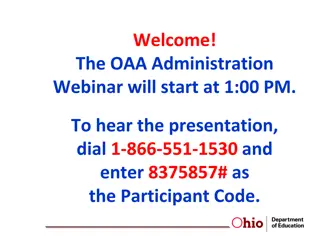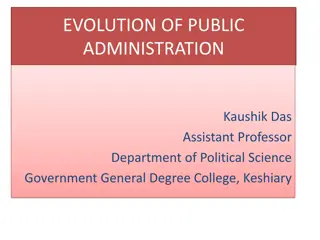Understanding POMS: Social Security Administration's Program Operations Manual System
POMS, the Program Operations Manual System of the Social Security Administration, covers critical information regarding trusts, SSI eligibility, and income assignments. Recent updates, like pre-approval requirements for fees in the SNT Community, shed light on the evolving regulations impacting beneficiaries. It clarifies that SSI payments are not assignable to a trust and provides insights into the treatment of income in special situations like SBPs. Delve into the details to navigate the complexities efficiently.
Download Presentation

Please find below an Image/Link to download the presentation.
The content on the website is provided AS IS for your information and personal use only. It may not be sold, licensed, or shared on other websites without obtaining consent from the author. Download presentation by click this link. If you encounter any issues during the download, it is possible that the publisher has removed the file from their server.
E N D
Presentation Transcript
POMS re: Trusts, ABLE and more Susie Germany Susie Germany Megan Brand Megan Brand Elder Law Section, March 2020 Elder Law Section, March 2020
POMS Overview O POMS does not = Pom-poms! O POMS is the Social Security Administration s Program Operations Manual System. O https://secure.ssa.gov/poms.nsf/ O What does Medicaid say about the POMS? O What s different about POMS released 4/2018 (in most cases the most current).
GN 03920.007 Introduced June 25, 2019 Upheaval in the SNT Community Archive of POMS on 9/25/2019 O It required pre-approval of fees by the SSA for any work performed by Attorneys or Professionals in re: eligibility for SSI. O This included drafting of SNTs O It also included pre-approval EVEN IF the work was not paid by the SSI beneficiary (Ex: parents paying for estate docs to include SNT for child who is on SSI) O It applied to professional fiduciaries charging for their time to complete various tasks, including verifying benefits with the SSA, etc. O Many in the SNT Community believe the POMS was archived only to be rewritten and reintroduced. https://naela.informz.net/informzdataservice/onlinever sion/ind/bWFpbGluZ2luc3RhbmNlaWQ9ODg0MTI1MyZ zdWJzY3JpYmVyaWQ9MTAyNDA5ODM2MQ==
SI 001120.200 O Pooled Trust Definition includes recognition of third party pooled trusts. O Special or Supplemental Needs Trust refers to FIRST FIRST party money . https://secure.ssa.gov/apps10/poms.nsf/lnx/0501120200
SI 001120.200,G,1.d. SSI Payments are Income O Clarifies that SSI payments are not assignable to a trust. They are ALWAYS going to be considered income. O Assignment of Income: O We consider assignment of payment by court orders to be irrevocable. For example, child support or alimony payments paid directly to a trust or trustee because of a court order are considered irrevocably assigned and thus not income. https://secure.ssa.gov/apps10/poms.nsf/lnx/0501120200
SI 001120.200,G,1.d. Assignment of Income and SBPs O Assignment of Income: O Also, U.S. Military Survivor Benefit Plan (SBP) payments assigned to a special needs trust are not income because the assignment of an SBP annuity is irrevocable O More on SBP s in the next POMS. https://secure.ssa.gov/apps10/poms.nsf/lnx/0501120200
SI01120.201.F.3.a re: Sole Benefit, Goods and Services 3. Explanation of the sole benefit rule for third party payments Consider the following disbursements or distributions to be for the sole benefit of the trust beneficiary: a. Payments to a third party that result in the receipt of goods or services by the trust beneficiary O The key to evaluating this provision is that, when the trust makes a payment to a third party for goods or services, the goods or services payment to a third party for goods or services, the goods or services must be for the primary benefit of the trust beneficiary must be for the primary benefit of the trust beneficiary. You should not read this so strictly as to prevent any collateral benefit to anyone else. For example, if the trust buys a house for the beneficiary to live in, that does not mean that no one else can live there, or if the trust purchases a television, that no one else can watch it. On the other hand, it would violate the sole benefit rule if the trust purchased a car for the beneficiary s grandson to take her to her doctor s appointments twice a month, but he was also driving it to work every day. when the trust makes a https://secure.ssa.gov/poms.nsf/lnx/0501120201
SI01120.201F.3.a re: Sole Benefit, Goods O Purchased goods that require registration or titling, for Purchased goods that require registration or titling, for example a car or real property, must be titled or registered in example a car or real property, must be titled or registered in the name of the beneficiary or the trust( the name of the beneficiary or the trust(ee does not permit it. does not permit it. For example, State law may not allow a car to be registered to the beneficiary, or may require a co-owner, if the beneficiary is a minor or an individual without a valid driver s license. Some State Medicaid agencies may permit a Some State Medicaid agencies may permit a car to be titled in a third party s name if the trustee holds a lien car to be titled in a third party s name if the trustee holds a lien on the car. A lien guarantees that the trust receives the value on the car. A lien guarantees that the trust receives the value of the car if it is sold and prevents the purchase from being of the car if it is sold and prevents the purchase from being considered a transfer of resources. considered a transfer of resources. O NOTE: NOTE: Even if a person or entity other than the beneficiary or the trust(ee) is listed on the title of the purchased good, it must still be used for the sole benefit of the trust beneficiary still be used for the sole benefit of the trust beneficiary. ee) unless State law ) unless State law it must https://secure.ssa.gov/poms.nsf/lnx/0501120201
SI01120.201.F.3.a re: Sole Benefit, third party service provider O A third party service provider can be a family member member, a non-family member, or a professional services company. The policy is the same for all. family https://secure.ssa.gov/poms.nsf/lnx/0501120201
SI01120.201.F.3.a re: Sole Benefit, Companion Services O Payment for companion services can be a valid expense. For example, perhaps an Alzheimer s patient cannot be left alone and requires a sitter, or the beneficiary needs someone to drive her to the store and assist her with grocery shopping. Family members may normally do some of these things without compensation, but may normally do some of these things without compensation, but that does not prohibit the trust from paying for these services. that does not prohibit the trust from paying for these services. Additionally, some incidental expenses for the companion can be payable. For example, if the trust pays a companion to take the For example, if the trust pays a companion to take the beneficiary to a museum, the trust can pay for the admission of the beneficiary to a museum, the trust can pay for the admission of the companion to the museum, as this cost is part of providing the companion to the museum, as this cost is part of providing the service. service. For payment of travel expenses for a companion, see SI 01120.201F.3.b. in this section. Family members O You should not request evidence of medical training or certification should not request evidence of medical training or certification for family members who receive payment to provide care. https://secure.ssa.gov/poms.nsf/lnx/0501120201
SI01120.201F.3.b re: Sole Benefit, Companion Services, cont. O Do not request income tax information or similar evidence Do not request income tax information or similar evidence from a service provider to establish a business relationship. from a service provider to establish a business relationship. If a family member service provider s income is relevant to the family member service provider s income is relevant to the beneficiary s SSI eligibility beneficiary s SSI eligibility or payment amount (for example, his or her income is part of the beneficiary s deeming computation as a deem or or ineligible child), request normal evidence of wages evidence of wages per SI 00820.130. request normal O NOTE: NOTE: You should not routinely question the reasonableness of You should not routinely question the reasonableness of a service provider s compensation. a service provider s compensation. However, if there is a reason to question the reasonableness of the compensation, you should consider the time and effort involved in providing time and effort involved in providing the services as well as the prevailing rate of compensation the services as well as the prevailing rate of compensation for similar services in the geographic area. https://secure.ssa.gov/poms.nsf/lnx/0501120201
SI01120.201.F.3.b re: Sole Benefit, Third Party Travel, part 1 b. Payment of third party travel expenses to accompany the trust beneficiary and provide services or assistance that is necessary due to the trust beneficiary s medical condition, due to the trust beneficiary s medical condition, disability, or age disability, or age Apply the following instructions in evaluating whether travel expenses are allowable and do not violate the sole-benefit rule: O Travel expenses are transportation, lodging, and food. O Providing services or assistance necessary due to the trust beneficiary s age means that the beneficiary is a minor and cannot travel unaccompanied. O Absent evidence to the contrary, accept a statement from the trustee that the service or accept a statement from the trustee that the service or assistance provided is necessary to permit the trust beneficiary to travel. Do not request assistance provided is necessary to permit the trust beneficiary to travel. Do not request a physician statement concerning medical necessity. a physician statement concerning medical necessity. You should not request evidence of medical training or certification for the person accompanying the trust beneficiary. O Use a reasonableness test in evaluating the number of people the trust is paying to Use a reasonableness test in evaluating the number of people the trust is paying to accompany the beneficiary. accompany the beneficiary. For example, it is reasonable for a trust to pay for other individuals, such as parents or caretakers, to accompany a disabled minor child on vacation to provide supervision and assistance. Travel without this support would not be possible. However, it would violate the sole benefit rule if the trust paid for other individuals who are not providing services or assistance necessary for the beneficiary to travel. NOTE: NOTE: In this example, the fact that the parents or caretakers cannot afford to pay for their other children s trip, or cannot leave them at home, is not a consideration relevant to the sole-benefit requirement. https://secure.ssa.gov/poms.nsf/lnx/0501120201
SI01120.201F.3.c re: Sole Benefit, Third Party Travel, part 2 c. c. Payment of third party travel expenses to visit a trust beneficiary Payment of third party travel expenses to visit a trust beneficiary The following travel expenses to ensure the safety or medical well to ensure the safety or medical well- -being of the trust beneficiary trust beneficiary are allowable and do not violate the sole-benefit rule: O Travel for a service provider to oversee the trust beneficiary s living arrangements when the beneficiary resides in an institution, nursing home, arrangements when the beneficiary resides in an institution, nursing home, other long other long- -term care facility term care facility (for example, group homes and assisted living facilities), or other supported living arrangements. O Travel for a trustee, trust advisor named in the trust, or successor to exercise Travel for a trustee, trust advisor named in the trust, or successor to exercise his or her fiduciary duties or to ensure the well his or her fiduciary duties or to ensure the well- -being the beneficiary does not does not reside in an institution. NOTE: NOTE: A third party can be a family member, non-family person, or another entity. If you have questions about whether a disbursement is permissible, please request assistance from your regional office. being of the trust beneficiary s living being of the beneficiary when http://policy.ssa.gov/poms.nsf/lnx/0501120201
SI01120.201.F.4 re: Sole Benefit, Administrative Expenses 4. Exceptions to the sole benefit rule for administrative expenses O The trust may also provide for reasonable compensation for (a) trustee(s) to manage the trust and reasonable costs associated trustee(s) to manage the trust and reasonable costs associated with investment, legal, or other services rendered with investment, legal, or other services rendered on behalf of the individual with regard to the trust. In evaluating what is reasonable compensation, consider the time and effort involved in providing the services and the prevailing rate of compensation for similar services considering the size and complexity of the trust. reasonable compensation for (a) https://secure.ssa.gov/poms.nsf/lnx/0501120201
SI01120.201.I.1.a re: Disbursements that are Income I. Policy for disbursements from trusts 1. Trust principal is not a resource If the trust principal (or a portion of the trust principal) is not a resource, disbursements from the trust (or that portion) may be income to the individual, depending on the nature of the disbursements. Regular rules apply to determine when income is available. a. Disbursements that are income O Cash paid directly from the trust to the individual is unearned income. We treat disbursements from the trust to the trust beneficiary s We treat disbursements from the trust to the trust beneficiary s personal debit card the same as cash disbursements. personal debit card the same as cash disbursements. We count the disbursement as unearned income for the month the disbursement is received or added to the debit card. https://secure.ssa.gov/poms.nsf/lnx/0501120201
SI01120.201.I.1.c re: Disbursements that are NOT Income Funds transferred from the trust into an Funds transferred from the trust into an account account established by the trust beneficiary under the Achieving a Better Life Experience (ABLE ABLE) Act are excluded from income to the excluded from income to the trust beneficiary trust beneficiary. For treatment of deposits into an ABLE account, see SI 01130.740. http://policy.ssa.gov/poms.nsf/lnx/0501120201
SI01120.201.I.1.e re: Administrator-managed prepaid cards, i.e. TrueLink e. e. Administrator Administrator- -managed prepaid cards managed prepaid cards Administrator-managed prepaid cards, such as True Link cards, are a type of restricted debit card that can be customized to block the cardholder s access to cash, specific merchants, or entire categories of spending. Typically, the trustee is the account owner and administrator, and the trust beneficiary is the cardholder. To evaluate the income and resource implications of trust disbursements to administrator-managed prepaid cards, we must determine who owns the prepaid card account. https://secure.ssa.gov/poms.nsf/lnx/0501120201
SI01120.201.I.1.e re: Administrator-managed prepaid cards, i.e. TrueLink If the trustee trustee is the owner of the prepaid card account: O Whether the trust beneficiary receives income from trust disbursements depends on the type of purchase reflected in the card statement. Treat purchases in the following manner: O If If the administrator-managed prepaid card is used to obtain cash, such as at an ATM, the withdrawal counts as unearned income. ATM, the withdrawal counts as unearned income. O If If the administrator-managed prepaid card pays for food or shelter items, such as charges at a restaurant, the individual will generally be charged with ISM up to the charges at a restaurant, the individual will generally be charged with ISM up to the PMV. PMV. O If the administrator If the administrator- -managed prepaid card pays for non managed prepaid card pays for non- -food, non such as for clothing at a department store, the individual usually does not receive such as for clothing at a department store, the individual usually does not receive income unless the item received would not be a totally or partially excluded non income unless the item received would not be a totally or partially excluded non- - liquid resource the following month. liquid resource the following month. O The administrator-managed prepaid card is not the trust beneficiary s resource. card is used to obtain cash, such as at an card pays for food or shelter items, such as food, non- -shelter items, shelter items, https://secure.ssa.gov/poms.nsf/lnx/0501120201
SI01120.201.I.1.e re: Administrator-managed prepaid cards, i.e. TrueLink If the trust beneficiary trust beneficiary is the owner card account: O Count all disbursements Count all disbursements from the trust onto the card as unearned income; and O Count any unspent balance on the card as a Count any unspent balance on the card as a resource as of the beginning of the month resource as of the beginning of the month after funds are loaded onto the card. owner of the prepaid https://secure.ssa.gov/poms.nsf/lnx/0501120201
SI01120.201.J.1.e re: U.S. Military Survivor Benefit Plans 1. Trust principal is not a resource e. U.S. Military Survivor Benefit Plans O The Howard P. Buck McKeon National Defense Authorization Act for Fiscal Year 2015 gives military members and retirees the option to irrevocably direct payment of a Survivor Benefit Plan (SBP) annuity for irrevocably direct payment of a Survivor Benefit Plan (SBP) annuity for a dependent child to a special needs trust for the benefit of a disabled a dependent child to a special needs trust for the benefit of a disabled child. child. Since the SBP annuity is irrevocably assigned to the special needs trust, the monthly annuity payments are not income beneficiary. Accept an assignment made in accordance with the applicable policies of the Department of Defense. For more information on special needs trusts, see SI 01120.203., and for more information on assignment of income, see SI 01120.201J.1.d. in this section. not income to the trust https://secure.ssa.gov/poms.nsf/lnx/0501120201
SI01120.201.K.2 re: 90 day amendment period, prior to 4/27/18 2. Trusts that previously met the requirements to be excepted under section 1917(d)(4)(A) or (C) of the Act A trust that was previously determined to be exempt from resource counting under section 1917(d)(4)(A) or 1917(d)(4)(C) shall continue to be excepted from resource counting, provided the trust is amended to conform with the policy requirements within 90 days. That 90-day period begins on the day SSA informs the recipient or representative payee that the trust contains provisions that must be amended in order to continue qualifying for the exception under section 1917(d)(4)(A) or (C). a. Existing situations prior to 04/27/18 Prior to 04/27/18, there were only four instances Prior to 04/27/18, there were only four instances where you could offer a 90-day amendment period: O Early Termination Provisions and Trusts (SI 01120.199.); O Sole Benefit Requirement and Third Party Travel Expenses (SI 01120.201F.2. in this section); O Pooled Trusts Management Provisions (SI 01120.225.); and O Null and Void Clauses in Trusts Documents (SI 01120.227.). Continue to apply these policies, where applicable. Continue to apply these policies, where applicable. https://secure.ssa.gov/poms.nsf/lnx/0501120201
SI01120.201.K.2 re: 90 day amendment period, as of 4/27/18 b. Situations on or after 04/27/18 O Effective 04/27/18, if due to a change in policy, a policy if due to a change in policy, a policy clarification, or the reopening of a prior erroneous trust clarification, or the reopening of a prior erroneous trust determination, determination, a trust that was previously determined to be exempt from resource counting under Section 1917(d)(4)(A) or (C) is determined to be a resource, offer a 90-day amendment period. c. During the 90-day period O Diary the case for follow up in 90 days. Do not count a previously excepted trust as a resource, and do not impose an overpayment, excepted trust as a resource, and do not impose an overpayment, pending possible amendment within the 90 pending possible amendment within the 90- -day period Do not count a previously day period. https://secure.ssa.gov/poms.nsf/lnx/0501120201
SI01120.201.K.2 re: 90 day amendment period d. Good cause extension O We permit each previously excepted trust only one 90 grant an extension request to the 90 grant an extension request to the 90- -day amendment period for good cause if the recipient day amendment period for good cause if the recipient requests it and provides evidence that the disqualifying issue cannot be resolved within the 90 requests it and provides evidence that the disqualifying issue cannot be resolved within the 90- - day period day period: for example, if a court must amend the trust and there is a wait to get on the court docket. Document in the file the grant of an extension, the time allowed (or tickle) the case for follow-up. e. End of the 90-day amendment period O If the trust is amended to be policy-compliant within the 90-day period (plus any extension), the trust continues to be excepted from resource counting. O If the trust still fails to meet If the trust still fails to meet the policy requirements after the expiration of the 90-day amendment period (plus any extension), begin counting the trust as a resource begin counting the trust as a resource under normal resource counting rules. The trust principal becomes a countable resource beginning with the later of (1) the date when the policy change later of (1) the date when the policy change or clarification first affects the resource determination or (2) the earliest date as of which the prior determination or (2) the earliest date as of which the prior determination or decision is reopened and revised. only one 90- -day amendment period. However, you may day amendment period. However, you may the time allowed, and the reason. Diary NOTE: NOTE: All trust determinations made at the end of the 90-day amendment period are subject to the rules of administrative finality. https://secure.ssa.gov/poms.nsf/lnx/0501120201
SI01120.203.B.3 Additions to d4A trusts 3. 3. Additions to trust after age 65 Additions to trust after age 65 O Additions to or augmentations of a trust after age 65 (except as outlined below) are not subject to this exception. Such additions may be income in the month added to the trust, depending on the source of the funds (see SI 01120.201J.) and may count as resources in the following months under regular SSI trust rules. Additions or augmentations do not include interest, dividends, or other earnings of the trust or any portion of the trust meeting the special needs trust exception. If the beneficiary s right to receive payments If the beneficiary s right to receive payments from an annuity, support payments, or Survivor Benefit Plan (SBP) from an annuity, support payments, or Survivor Benefit Plan (SBP) payments (see payments (see SI 01120.201J.1.e. SI 01120.201J.1.e.), is irrevocably assigned to the trust, ), is irrevocably assigned to the trust, and such assignment is made when the trust beneficiary was less than and such assignment is made when the trust beneficiary was less than 65 years of age, treat the payments paid to a special needs trust the 65 years of age, treat the payments paid to a special needs trust the same as payments made before the individual attained age 65. same as payments made before the individual attained age 65. Do not disqualify the trust from the special needs trust exception. O https://secure.ssa.gov/apps10/poms.nsf/lnx/0501120203
SI01120.203.B.4 Disabled 4. 4. Disabled Disabled To qualify for the special needs trust exception, the individual whose assets were used to establish the trust must be disabled for SSI purposes under section 1614(a)(3) of the Act as of the date on which the trust s resource status could affect the individual s SSI eligibility. In cases where you need to develop for disability, obtain a disability determination from the disability determination services (DDS) following procedure in SI 01150.121D.2. Develop disability as of the date on which the trust s resource status Develop disability as of the date on which the trust s resource status could affect SSI eligibility. * could affect SSI eligibility. * If DDS determines that the trust beneficiary was: O disabled as of the date the trust's resource status could have affected SSI eligibility, the special needs trust meets the disability requirements for exception; or O not not disabled as of the date the trust's resource status could have affected SSI eligibility, evaluate the trust under instructions in SI 01120.201. Since the trust provisions take precedence over the transfer provisions (see SI 01120.201D.5.), depending on the terms of the trust, the trust may count as a resource or the transfer penalty may apply (see SI 01150.121.). *Revised as of 6/26/2019 TN 58 https://secure.ssa.gov/apps10/poms.nsf/lnx/0501120203
SI01120.203.B.4 Disabled, cont. Example Scenario 1: Mark, a special needs trust beneficiary whose trust was established in 2015, applies for SSI Aged benefits in 2019. Even though disability is not a requirement for SSI Aged benefits, we must develop disability as of Mark's SSI application date in 2019 for purposes of the Medicaid trust exception. O Example Scenario 2: Example Scenario 2: Sally has a special needs trust that was established in 2010 when she was 10 years old. At the time, she was not eligible for SSI Child benefits because of her deeming parents' income and resources. However, she applies for SSI Adult benefits in 2018. We must develop disability as of Sally's SSI application date in 2018. 2010 is not relevant because the trust did not present as a resource issue until the SSI application date in 2018. O Example Scenario 1: *Revised as of 6/26/2019 TN 58 https://secure.ssa.gov/apps10/poms.nsf/lnx/0501120203
SI01120.203.C Policy for d4A trusts est. after 12/13/2016 C. Policy for special needs trusts established under section 1917(d)(4)(A) of the Act on or after December 13, 2016 1. General rules for special needs trusts established on or after December 13, 2016 On December 13, 2016, the President signed into law the 21st Century Cures Act (Public Law 114-255). Section 5007 of this Act allows individuals to establish their own special needs trusts and qualify for the exception to resource counting under Section 1917(d)(4)(A) of the Social Security Act. The resource counting provisions of section 1613(e) do not apply to a trust that: O contains the assets of an individual who is under age 65 and is disabled; O is established for the benefit of such individual through the actions of the individual individual, a parent, a grandparent, a legal guardian, or a court; and O provides that the State(s) will receive all amounts remaining in the trust upon the death of the individual up to an amount equal to the total medical assistance paid on behalf of the individual under a State Medicaid plan. https://secure.ssa.gov/poms.nsf/lnx/0501120203
SI01120.203.C Policy for d4A trusts est. after 12/13/2016 C. Policy for special needs trusts established under section 1917(d)(4)(A) of the Act on or after December 13, 2016 1. General rules for special needs trusts established on or after December 13, 2016 On December 13, 2016, the President signed into law the 21st Century Cures Act (Public Law 114-255). Section 5007 of this Act allows individuals to establish their own special needs trusts and qualify for the exception to resource counting under Section 1917(d)(4)(A) of the Social Security Act. The resource counting provisions of section 1613(e) do not apply to a trust that: O contains the assets of an individual who is under age 65 and is disabled; O is established for the benefit of such individual through the actions of the individual individual, a parent, a grandparent, a legal guardian, or a court; and O provides that the State(s) will receive all amounts remaining in the trust upon the death of the individual up to an amount equal to the total medical assistance paid on behalf of the individual under a State Medicaid plan. https://secure.ssa.gov/poms.nsf/lnx/0501120203
SI01120.203.C Policy for d4A trusts est. after 12/13/2016, cont. a. a. Power of attorney Power of attorney O We consider a trust established under power of attorney (POA) for the disabled individual to be established through the actions of the disabled individual because the POA establishes an agency relationship. For additional information on a POA, see SI 01120.203C.3in this section. b. b. Use of a seed trust Use of a seed trust O If the legally competent, disabled adult does not establish the trust, a parent or grandparent may establish a seed trust using a nominal amount of his or her own money or, if State law allows, an empty or dry trust. After the seed trust is established, the legally competent, disabled adult may transfer his or her own assets into the trust, or another individual with legal authority (such as a power of attorney) may transfer the individual's assets into the trust. To determine if the individual had legal authority, see SI 01120.203C.9. in this section. https://secure.ssa.gov/poms.nsf/lnx/0501120203
SI01120.203.E Allowable and Prohibited expenses from d4A and d4C trusts The following instructions, about trust expenses and payments, apply to Medicaid special needs trusts and to Medicaid pooled trusts. 1. Allowable administrative expenses Upon the death of the trust beneficiary, the trust may pay the following types of administrative expenses from the trust prior to reimbursement of the State(s) for medical assistance: O Taxes due from the trust to the State(s) or Federal government because of the death of the beneficiary; O Reasonable fees for administration of the trust estate, such as Reasonable fees for administration of the trust estate, such as an accounting of the trust to a court, completion and filing of an accounting of the trust to a court, completion and filing of documents, or other required actions associated with documents, or other required actions associated with termination and wrapping up of the trust. termination and wrapping up of the trust. https://secure.ssa.gov/poms.nsf/lnx/0501120203
SI01120.203.E Allowable and Prohibited expenses from d4A and d4C trusts 2. Prohibited expenses and payments Upon the death of the trust beneficiary, the following are examples of some of the types of expenses and payments not permitted prior to reimbursement of the State(s) for medical assistance: O Taxes due from the estate of the beneficiary other than those arising from inclusion of the trust in the estate; O Inheritance taxes due for residual beneficiaries; O Payment of debts owed to third parties; O Funeral expenses; and O Payments to residual beneficiaries. NOTE: NOTE: For the purpose of prohibiting payments prior to reimbursement of the State(s) for medical assistance, a pooled trust is not considered a residual or remainder beneficiary. Remember that a pooled trust has the right to retain funds upon the death of the beneficiary. https://secure.ssa.gov/poms.nsf/lnx/0501120203
